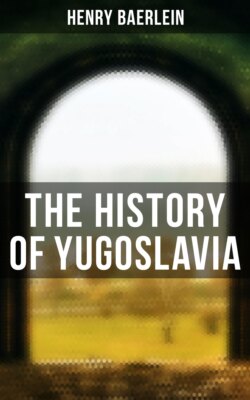Читать книгу The History of Yugoslavia - Henry Baerlein - Страница 45
На сайте Литреса книга снята с продажи.
FOOTNOTES:
Оглавление[20] Cf. La Question Yougo-Slav, by Vouk Primorac. Paris, 1918.
[21] When the Slav first arrived in these territories the Romans everywhere yielded to them, and while the more prosperous Romans settled on the coast, the others retired to the mountains. One of the sea-towns, by the way, to which the Romans fled was Split, where they could live in the ruins of Diocletian's enormous, decadent palace; and from extant lists of the mayors of that town we see that until the tenth century they all had Latin names, from then till the twelfth century we find partly Latin and partly Slav names, and during the thirteenth and fourteenth centuries their names were nearly always Slav. Those Romans—of course not implying by that word that their forbears had come from Rome or even from Italy—those refugees who took to the mountains mingled with the Slavs and were also joined by wandering shepherds from Wallachia, owing to whom all this variegated population came to be called Black Vlachs, Mauro-Vlachs and in English Morlaks. The epithet "black" was attached to the Vlachs, so Jirećek thinks (cf. Bulletino di Archeologia Dalmata, Split, 1879), on account of the hordes of Black Tartars who until the beginning of the fourteenth century infested the plains of Moldavia. Gradually in this hinterland population the Roman and the Vlach died out, but the latter's name was retained. It had lost its ethnic meaning and among the Ragusan poets of the sixteenth and seventeenth centuries the word was used to signify a shepherd. The Venetians employed the word Morlacchi as a term of mockery, because it indicated people of the mountains, backward people. And this derogatory connotation has clung to it, so that to-day the Morlaks, who after all are Croats and Serbs, do not like to be called by that name.
[22] The Serbian Archbishopric of Peć, which Dušan at his coronation had raised to the Patriarchate, was for the time being left intact.
[23] This is a Pomak song. The Pomaks are the descendants of those who in the seventeenth century (perhaps also earlier) were forcibly converted to Islam. Their folk-songs, customs and language are Bulgarian. They speak the purest Bulgarian, save that the men count with Turkish numerals. (The women, who can count up to 100, use the Bulgarian language.) The Pomaks live for the most part in the Rhodope Mountains and in the Lovac district of northern Bulgaria. They are endowed, as a rule, with meagre intelligence, so that the educational endeavours of the Bulgarian Government had perforce to be abandoned, since very few of these reluctant pupils ever left the lowest class. The most exalted situation they aspire to is to serve as clerks to Muhammedan priests. Nevertheless, they despise the Turks and call their language the language of pigs.
[24] To-day in Serbia when the King addresses his people, when the deputies address the Parliament, the mayor his fellow-citizens, the priest his parishioners, the officer his men—all of them begin with the words "Moja bratčo!" ["My brothers!"]
[25] Cf. Baranja multja es jelenje, 2 vols., by Francis Varady. Pecuj, 1898.
[26] Die südslavischen Literaturen. Leipzig, 1908.
[27] Cf. Le Balkan Slave, by Charles Loiseau. Paris, 1898.
[28] La Dalmazia. Florence, 1915.
[29] There is in the museum at Eger in Czecho-Slovakia a small painting of Branković dated 1711. It depicts him standing pensively outside a tent, clad in a red and yellow Turkish costume and with a beard that reaches to his knees. On the other hand, it seems to be established that he was an ordinary inmate of the prison, whose site is now occupied by the Café Astoria; and one's faith in the accuracy of the Eger Museum is rather dimmed by the exhibition of a number of pictures, each of them purporting to give the authentic details of the assassination at Eger of the great Wallenstein, and every picture is quite different from the others.
[30] Macedonia. London, 1906.
[31] This was far too sweeping a statement. Only thirty or forty Orthodox at Prizren—teachers, merchants and others—used to dress in European raiment (with a fez), but from of old the Serbs had a teachers' institute and a seminary—the young men educated there frequently went to Montenegro. And in view of what happened a few years later, Miss Edith Durham must regret that in her book High Albania (London, 1909) she did not confine herself to recording of the men of Prizren that "of one thing the population is determined: that is, that never again shall the land be Serb"; but she adds, on her own account, that in this picturesque town and its neighbourhood the Serbs are engaged in a forlorn hope and that their claims are no better than those of the English on Normandy. Yet if, in her opinion, the Serbs have been rewarded beyond their deserts, she must acknowledge that they are not wholly undeserving—in the days of her cherished Albanians it was necessary for a Catholic inhabitant to furnish himself with a loaded revolver before guiding her through the streets of Djakovica.
[32] Cf. Les Albanais en Vieille-Serbie et dans le Sandjak de Novi-Bazar. Paris, 1913.
[33] He worked for a long time at the monastery of Hopovo, among the Syrmian hills, and there his collection of books, in the two rooms just as he left them, was naturally treasured. Half of them were stolen in the course of this last war by the Austrians.
[34] Geschichte der Franzfelder Gemeinde. Pančevo, 1893.
[35] This was originally as much land as a yoke of oxen could plough in a day. Until the introduction of the French metrical system this measurement was used in Austria. It still survives there, a "joch" or yoke being equivalent to 5754·6 square metres, or about 1·4 English acres. The Hungarian joch is three-quarters the size of this.
